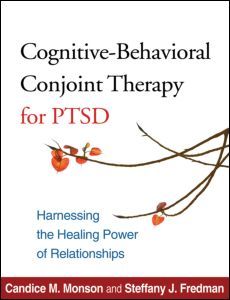Cognitive-Behavioral Conjoint Therapy for PTSD Harnessing the Healing Power of Relationships
Auteurs : Monson Candice M., Fredman Steffany J.

Presenting an evidence-based treatment for couples in which one or both partners suffer from posttraumatic stress disorder (PTSD), this step-by-step manual is packed with practical clinical guidance and tools. The therapy is carefully structured to address both PTSD symptoms and associated relationship difficulties in a time-limited framework. It is grounded in cutting-edge knowledge about interpersonal aspects of trauma and its treatment. Detailed session outlines and therapist scripts facilitate the entire process of assessment, case conceptualization, and intervention. In a large-size format for easy photocopying, the book includes 50 reproducible handouts and forms.
I. Background and Overview of CBCT for PTSD 1. An Introduction to Cognitive-Behavioral Conjoint Therapy for PTSD 2. Initial Assessment, Case Conceptualization, and Working with Complex Cases II. CBCT for PTSD Treatment Manual Phase 1. Rationale for Treatment and Education about PTSD and Relationships Session 1. Introduction to Treatment Session 2. Safety Building Phase 2. Satisfaction Enhancement and Undermining Avoidance Session 3. Listening and Approaching
Session 4. Sharing Thoughts and Feelings: Emphasis on Feelings
Session 5. Sharing Thoughts and Feelings: Emphasis on Thoughts
Session 6. Getting U.N.S.T.U.C.K. Session 7. Problem Solving to Shrink PTSD Phase 3. Making Meaning of the Trauma(s) and End of Therapy Session 8. Acceptance Session 9. Blame Session10. Trust Session 11. Control Session 12. Emotional Closeness Session 13. Physical Closeness Session 14. Posttraumatic Growth Session 15. Review and Reinforcement of Treatment Gains
Candice M. Monson, PhD, is Professor of Psychology at Toronto Metropolitan University in Toronto, Ontario, Canada. A Fellow of the American and Canadian Psychological Associations and the Royal Society of Canada, she is a recipient of the Traumatic Stress Psychologist of the Year Award from the Canadian Psychological Association and the Distinguished Mentorship Award from the International Society for Traumatic Stress Studies. Dr. Monson is well known for her research on interpersonal factors in traumatization and the development, testing, and dissemination of treatments for posttraumatic stress disorder (PTSD), including cognitive processing therapy and cognitive-behavioral conjoint therapy for PTSD.
Steffany J. Fredman, PhD, is Assistant Professor of Human Development and Family Studies at the Pennsylvania State University. Dr. Fredman is a recipient of the Martin S. Wallach Award for Outstanding Doctoral Candidate in Clinical Psychology from the University of North Carolina at Chapel Hill. Her clinical and research interests focus on the interpersonal context of individual psychopathology, with an emphasis on PTSD. Dr. Fredman is the codeveloper of cognitive-behavioral conjoint therapy for PTSD and is currently adapting this treatment model for telehealth delivery as a way to increase access to care for traumatized individuals and their significant others.
Date de parution : 09-2012
Ouvrage de 258 p.
20.3x26.7 cm



